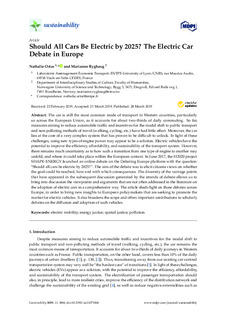| dc.contributor.author | Ortar, Nathalie | |
| dc.contributor.author | Ryghaug, Marianne | |
| dc.date.accessioned | 2019-09-25T16:49:01Z | |
| dc.date.available | 2019-09-25T16:49:01Z | |
| dc.date.created | 2019-04-01T16:25:18Z | |
| dc.date.issued | 2019 | |
| dc.identifier.citation | Sustainability. 2019, 11 (7), 1-16. | nb_NO |
| dc.identifier.issn | 2071-1050 | |
| dc.identifier.uri | http://hdl.handle.net/11250/2618831 | |
| dc.description.abstract | Abstract: The car is still the most common mode of transport in Western countries, particularly so across the European Union, as it accounts for about two-thirds of daily commuting. So far, measures aiming to reduce automobile traffic and incentives for the modal shift to public transport and non-polluting methods of travel (walking, cycling, etc.) have had little effect. Moreover, the car lies at the core of a very complex system that has proven to be difficult to unlock. In light of these challenges, using new types of engine power may appear to be a solution. Electric vehicles have the potential to improve the efficiency, affordability, and sustainability of the transport system. However, there remains much uncertainty as to how such a transition from one type of engine to another may unfold, and where it could take place within the European context. In June 2017, the H2020 project SHAPE-ENERGY launched an online debate on the Debating Europe platform with the question: “Should all cars be electric by 2025?”. The aim of the debate was to elicit citizens views on whether the goal could be reached, how and with which consequences. The diversity of the vantage points that have appeared in the subsequent discussion generated by the strands of debate allows us to bring into discussion the viewpoints and arguments that are not often addressed in the literature on the adoption of electric cars in a comprehensive way. The article sheds light on those debates across Europe, in order to bring new insights to European policymakers that are seeking to promote the market for electric vehicles. It also broadens the scope and offers important contributions to scholarly debates on the diffusion and adoption of such vehicles. | nb_NO |
| dc.language.iso | eng | nb_NO |
| dc.publisher | MDPI | nb_NO |
| dc.rights | Navngivelse 4.0 Internasjonal | * |
| dc.rights.uri | http://creativecommons.org/licenses/by/4.0/deed.no | * |
| dc.title | Should All Cars Be Electric by 2025? The Electric Car Debate in Europe | nb_NO |
| dc.type | Journal article | nb_NO |
| dc.type | Peer reviewed | nb_NO |
| dc.description.version | publishedVersion | nb_NO |
| dc.source.pagenumber | 1-16 | nb_NO |
| dc.source.volume | 11 | nb_NO |
| dc.source.journal | Sustainability | nb_NO |
| dc.source.issue | 7 | nb_NO |
| dc.identifier.doi | 10.3390/su11071868 | |
| dc.identifier.cristin | 1689576 | |
| dc.relation.project | EC/H2020/731264 | nb_NO |
| dc.description.localcode | © 2019 by the authors. Licensee MDPI, Basel, Switzerland. This article is an open access article distributed under the terms and conditions of the Creative Commons Attribution (CC BY) license (http://creativecommons.org/licenses/by/4.0/). | nb_NO |
| cristin.unitcode | 194,62,40,0 | |
| cristin.unitname | Institutt for tverrfaglige kulturstudier | |
| cristin.ispublished | true | |
| cristin.fulltext | original | |
| cristin.qualitycode | 1 | |

